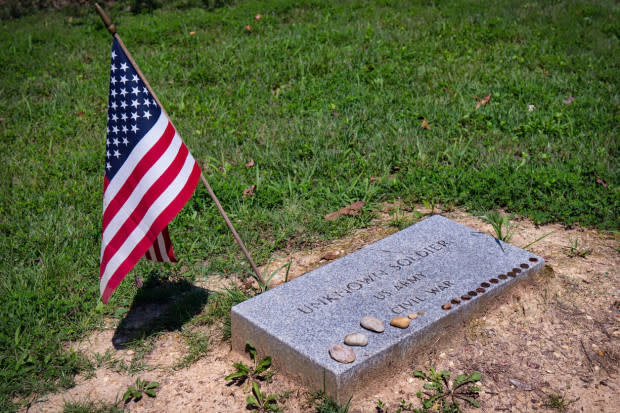Why You Shouldn't Remove Coins on a Gravestone if They Suddenly Appear

Cemeteries can be creepy places for some; they’re obviously the backdrops in many horror films and house dead bodies. But cemeteries are also full of memorials to loved ones and can be a calming place, especially for those visiting the grave of someone they were close to. And if you’ve gone to a cemetery and noticed coins on top of a gravestone, this is also a way to remember or honor someone who’s died. But what does it mean?
Essentially this tradition has to do with military graves—so, if you’re curious about what coins on a gravestone mean, why you shouldn’t remove them and where this tradition came from, keep reading.
Related: The 15 Best Patriotic Movies
What do coins on a gravestone mean?
As Chicago’s ABC 7 reported, coins on a tombstone or grave are a way to honor a deceased military member. It’s a way to honor them or pay their respects to the fallen soldier and let the living family members know that they’re being honored even after death.
The Wounded Warrior Project has explained that coins on gravestones date back to the Roman Empire, when they placed coins on dead soldiers’ mouths. If you know Greek or Roman mythology, you’ll recognize that this is to pay for the dead person’s passage across the River Styx in the Underworld (Hades). A Navy superstition also had sailors placing coins under the mast of ships to pay for safe passage if they died while out at sea.
This tradition apparently gained popularity while the Vietnam War was raging on in the 1970s. With a lot of backlash and negative opinions about the war from the public—the first time the American public really had this time of negative reaction to a war—leaving coins on gravestones was a way to quietly and privately pay respects to the fallen soldier.
What do different coins mean when put on a grave?

iStock
Just like different colors of porch lights mean different things, different types of coins left on a soldier’s grave also have their own meanings. According to ABC 7:
A penny means that someone visited.
Nickels are from someone who trained with the deceased military member.
A dime is left by someone who served with the soldier.
A quarter left on a soldier’s grave means that the person who left it was with them when they died.
Why you shouldn’t move coins on a gravestone
These coins aren’t thrown on these gravestones just because—instead, they’re honoring and showing respect for dead soldiers. So one reason you shouldn’t remove them is that it disrespects that gesture and also might upset living family members if they notice.
But another reason you shouldn’t remove a coin from a gravestone is actually a practical one. The Wounded Warrior Project explains that sometimes after the coins have sat there for a while, they’re collected and used to fund the cemetery or even pay for homeless veterans’ burials.
So whenever you find yourself in a cemetery in the future, take a look around and you might just notice some coins on top of graves. Maybe, now that you know what that means, you'll even leave some pennies too.
Next up, find out why you shouldn't remove a dryer sheet left in your mailbox.